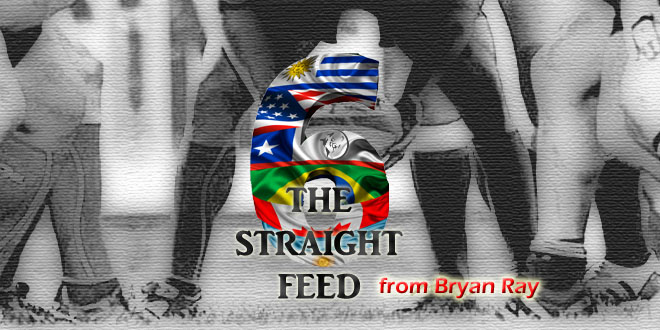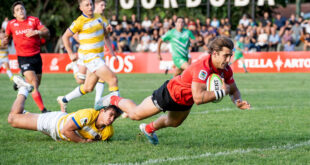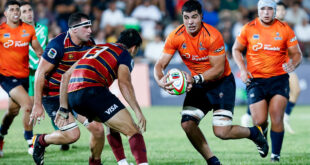So the secret is out. The Americas 6 Nations competition is a go. It will run concurrently with the original tournament that inspired it in February and March, and will add Brazil and Chile into the mix with the established quartet of Argentina, Canada, Uruguay, and the USA. Of those, Brazil has been most forthcoming in releasing their schedule and giving us a first glimpse of what could be a tournament logo. Bizarrely, none of the bigger nations have put anything official on record, though Pumas head coach Daniel Hourcade has admitted that it is on his schedule for next year, and there is some other fledgling event just about to start tying up communications resources…
The official title will be the Americas Rugby Cup, not to be confused with the Americas Rugby Championship, a second-string competition run in October that – from our understanding – will continue to take place as a development tool. On that point, however, it seems unlikely that true first-string sides from Canada, the Eagles, or the Pumas will take part, with a number of factors involved prohibiting overseas pros in particular from taking part.
Direct conflicts on the calendar include World Sevens Series stops in Sydney (Feb 6-7), Las Vegas (Mar 4-6), and Vancouver (Mar 12-13). This has caused some scheduling issues, but those appear to have been resolved. Brazil’s draft schedule has been re-jigged specifically to avoid the Vancouver tournament, with their proposed March 12 match in Canada now moved to February 20.
Clashes with the Super Rugby and European club season, on the other hand, are not so easily avoidable. With Japan’s entrant to the premier Southern hemisphere competition now seriously in doubt, the Super Rugby schedule has yet to be finalised, but in any event Argentina will be obliged to play competitive teams in each fixture, which means their Americas Rugby Cup games will feature a mix of extras from that group and players just outside, recent u20 grads and fringe candidates. A few senior campaigners may be drafted in to play Canada and the USA, but even that seems unlikely at best.
That in itself is no big change from the status quo. Similar Argentine sides have always been rolled out in the Sudamerica (formerly CONSUR) competition in recent years, and with their impressive strength in depth the Pumas should remain clear favorites to top the table.
For Canada and the USA, however, the issue is more complicated. Their European-based professionals will not have releases written into their contracts, and while Regulation 9 may dictate that clubs must cooperate, it’s also imperative that the North American sides maintain strong working relationships with those clubs to ensure those players are available for the more difficult Pacific Nations Cup and November tour windows without losing their contracts.
The unfortunate fact is that American players do not fall under the Kolpak ruling, and are therefore cast in the same category as those from strongholds like New Zealand and Australia. If our best are unavailable for a further 6 weeks of the club calendar, the likelihood of them getting even mid-level professional contracts overseas will drop dramatically.
Looking at the composition of the respective World Cup sides, it’s clear that the Sevens Series will also have a significant effect on selection. Almost a third of the Canadian squad, including most of the backs, can be expected to be challenging for spots on the Sevens roster heading into the all-important Olympic year. A half-dozen Eagles will also be there or thereabouts.
In fact, only 11 players of the Canada’s nominated 31 do not currently have professional or sevens obligations following the World Cup, and one would expect at least two or three of those to pick up contracts very quickly after the tournament. The Eagles are only slightly better off, with about 13 locally-based outside of Mike Friday’s sevens group, and chances are the likes of AJ MacGinty will be snapped up by somebody before the end of October.
Another salient point is that there is a strong chance that we will see entirely new coaching setups in place for both North American sides. While Kieran Crowley might well remain to see out his contract which expires in June, he will need at least need a new support staff. Mike Tolkin’s status is up in the air, with a recent upswing in fortunes in his favour. Odds are that both head coach jobs will be advertised, and few would deny the considerable opportunities that those positions would entail for an ambitious coach looking to step into the international waters.
Given those circumstances, we should see plenty of new faces come the spring, equally daunting as it is exciting. Uruguay’s ability to select close to their best side, as well as the improvements to both Brazil and particularly Chile, will mean that each game will be competitive. In the long term that bodes well not only in terms of expanding the player pool, but also building a more sturdy supporters base. A full-strength Canadian side would decimate Brazil, precisely the situation the stakeholders are keen to avoid.
There are other long-term considerations that further boost the value of a new competition. Piggybacked on the European competition are a full series of senior women’s and u20 matches. At one time that also included ‘A’ internationals, though in recent years that stream has all but evaporated. If the inaugural Americas Rugby Cup can attract enough attention – and let’s hope it does – there is every chance we will see the women and u20s added in due time. That would be a monumental improvement on the current painfully limited environment.
Of course none of this comes cheap. World Rugby will be expected to pony up and foot a large chunk of the bill, but surely this must be seen as a worthwhile investment. Even the most parochial supporter of Tier 1 rugby must realise the gravy train is down to a drip, and the mammoth potential of the United States market must be given the utmost attention as we hurtle towards the expected windfall in popularity from the Olympics. Rugby may never quite make it to the mainstream in these parts, but it is moving up the ladder, nudging just beyond the status of curiosity. The Americas Rugby Cup is a step towards grabbing some much-needed attention.
THE WORLD CUP
Oh right, about that. I recently had the pleasure of appearing on the Try & Tackle podcast with Patrick Johnston of The Province. For thoughts on Canada’s standing heading into the tournament, and possible team selection, do check that out.
 Americas Rugby News Rugby news from across the Americas!
Americas Rugby News Rugby news from across the Americas!




